Transcription
"C" Number Prisoners:
Pawns of the Demagogues
Fear. Just as assuredly as a Wall Street broker will promote stock of dubious worth if they will advance his career, for the past quarter century, Illinois' politicians have utilized fear to attain higher office within the state. The effects of such demagoguery are now becoming apparent to the citizenry, as the bills for the state's failed criminal justice system continue to grow out of control, and Illinois' political leadership appears to be either unwilling or unable to seriously consider and then implement the reforms required to ensure that the criminal justice process will protect both the public-at-large, while providing the incarcerated with the opportunity to become constructive members of society.
As any student of political science will readily attest, politicians on both sides of the aisle have through the ages used the fear of crime to elevate themselves to higher office. In the 1930's, New York's attorney general, Thomas E. Dewey, transformed his prosecution of the Mafia into two teams the state's governor, and then barely lost his pursuit of the presidency in 1948 to Harry Truman. Rudy Guiliani used similar tactics to become the mayor of New York City, and he seriously considered running for the presidency until his polls convinced him that such an attempt would be futile.
In Illinois, the most successful practitioner of such demagoguery in recent times was James R. Thompson, and it is to him that we can attribute the current crisis in the state's criminal justice system. In the early 1970's, Thompson was then the United States Attorney for the Northern District of Illinois. After a series of highly publicised trials in which he successfully prosecuted several high profile defendants, he set his sights on the governor's residence. Running as a "law and order" Republican, he defeated his opponent by portraying him as being "soft on crime." Assuming office, he quickly pushed through the legislature a major overhaul of the criminal justice system. The ramifications of these changes would be huge: gone was ability of a judge to sentence most defendants to probation instead of sending them to the penitentiary, and the indeterminant sentencing structure, whereby a person would receive a minimum and maximum sentence was eliminated, and determinant sentences would now be imposed. Where in the past, a convicted armed robber might receive a sentence of two to six years, now his sentence be a flat one, ranging from six to 30 years. Where a parole board would have previously considered his release, the new system would only release that individual upon the completion of his or her sentence. There were two serious drawbacks to the new sentencing laws - prisoners who had rehabilitated themselves were now kept in prison long after they had ceased to be a threat to the community, while individuals who continued to be dangerous had to be released once their sentence had been served. Lastly, all convicts then serving as indeterminant sentence were offered the opportunity to be converted to a determinant one, with one notable exception: anyone with a minimum sentence of 20 years or more was prohibited from receiving a determinant one. It is the intent of this paper to present a brief overview of the major consequences of the Thompson laws, and additionally, put a human face those relegated to the netherlands of being known as a "C" number.
Prior to 1978, Illinois had four maximum security prisons (Joliet, Menard, Pontiac and Stateville), one medium security one (Vandalia) and one minimum security prison (Vienna). Since then, the state has opened nearly 20 institutions, and two more are either under construction or awaiting the funding to open them.
The Department of Corrections' budget now exceeds $1.3 billion dollars, and it has a workforce of more than 18,000 employees. Only the Department of Human Services and Public Aid are a greater drain upon the public treasury. A further breakdown of the department's expenditures on an institution-by-institution basis will more clearly define why Illinois is in such financial straits at the present time. According to the Auditor General's Office, in FY 2000 (the most recent figures available) the Menard Corr. Center spent $42,575,415 for the salaries of 1,087 employees. For the mathematically challenged, this averages out to $39,166 per employee. It should be noted that the qualifications required to become a security guard in an Illinois prison are minimal: one must be a high school graduate, and possess a valid driver's license.
To justify such vast expenditures, the department should be required to meet such basic goals as promoting respect for the law, providing elementary rehabilitative programs, and protecting the public. By all accounts, the department has failed miserably. For example; Illinois law mandates that all prisoners receive a minimum of one hour outside of their cell per day for exercise, and to be fed a nutritious diet. However, Menard only allows its inmates outside of their cells twice per week for exercise, and allows only 10 minutes to eat a meal, although the American Correctional Association (which has certified that Menard meets all its standards) requires a minimum of 20 minutes to consume a meal. Complaints from Menard residents to Governor Ryan's officer, the Department of Correction and the A.C.A have either been rebuffed, or gone unanswered. Prisoners find it difficult to have respect for a legal system that utterly fails to comply with the minmal, basic standards of treatment that Illinois law supposedly guarantees.
Rehabilitative programming is rapidly becoming a distant memory. Where thousands of inmates were once enrolled in a variety of educational and vocational programs, only a select few are now allowed to participate. Thanks to President Clinton and Texas Sen. Kay Bailey Hutchison, inmates can no longer use Pell Grants to pay for college institution, and Gov. Ryan recently announced that state funded academic classes will soon have to be eliminated due to the state's bleak fiscal picture. The future for me remaining vocational programs in seriously in doubt as well, as the governor has refused to guarantee their funding past this fiscal year. If you think that the dimunition of these programs affects only those prisoners who have previously partaken in them, think again. Approximately 95% of the individuals who are presently incarcerated in state prisons will eventually be released back in to society. Certainly there can be no logic in confining people for years, if not decades, without providing them with an opportunity to find gainful employment upon their release. To do otherwise will essentially ensure that they are doomed to return to a life of crime, merely to survive. Crimes which will committed in your community.
I now wish to address the issue the "C" number prisoners still languishing in Illinois' prisons. When the determinant sentencing laws were enacted, the old parole boards was eliminated and a new entity called the "Prisoner Review Board" was incorporated. Between 1978 through 1981, the board granted parole in 47% of the 13,591 cases which came before it. However, since 1984 the release for all parole applications has hovered between 1.2 and 5 percent, and as there has been no modification in the board's parole consideration rules, advocates for prisoner's rights have been at a loss as to the rationale for the board's refusal to release anyone on parole.
Your typical "C" number prisoner has been incarcerated in excess of 30 years; many have earned advanced college degrees, while others successfully completed a variety of vocational programs, including auto mechanics and body repair, electronics and television repair, and a multitude of culinary arts programs. Many were actively involved in the incorporation of United States Jaycees chapters within the prison walls; this world-wide organization is universally recognised for its leadership training and personal development programs, and scores of Illinois prisoners learned not only the theoretical value of these skills, but for decades were able to make a practical application of them both inside and outside of the prison's walls by wardens who recognised the inherent benefits to be derived by encouraging men to develop and utilise their intellectual abilities in a positive manner. Here are but a few examples of what these organisations were able to accomplish: the Stateville chapter raised several thousand dollars, which was used to take disadvantaged children on a Christmas shopping spree; Menard's chapter refurbished a house which visitors could stay at while visiting their loved ones; and Centralia's raised enough money to completely pay for a special olympics for handicapped children. Unfortunately, the security guards' union perceived these organisations as a threat to their ability to retain control of the prisons, and by the end of the past decade, they had abolished the chapters in all state facilities.
Notwithstanding these accomplishment, the Prisoner Review Board has essentially cut off parole as an avenue by which a prisoner can hope to be released. Although the Illinois State Police's own statistics clearly indicate that since 1994 there has been a 20 percent reduction in serious crimes, lawmakers have continuously attempted to reinforce the public perception that violent crime is escalating unabated by enacting still tougher legislation. Now is the time for Illinois' citizens to reject this demagoguery, and instead, demand accountability from the state's prison system. The question to ask is "why"... why is the recidivism rate for released offenders 39% after three years... why does it cost $18,5000 to incarcerate a person for a year, while that same person could enrol in the University of Illinois for only $11,600... why can't the Department of Corrections meet the minimum legal standards of treatment for those in its charge... why must be spend nearly $40,000 yearly fir a high school graduate whose only responsibility is to watch someone sit in a cage all day.
Other posts by this author
|
2020 jul 25

|
2017 aug 4

|
2016 oct 4

|
2016 aug 13

|
2016 may 8

|
2016 may 4

|
More... |

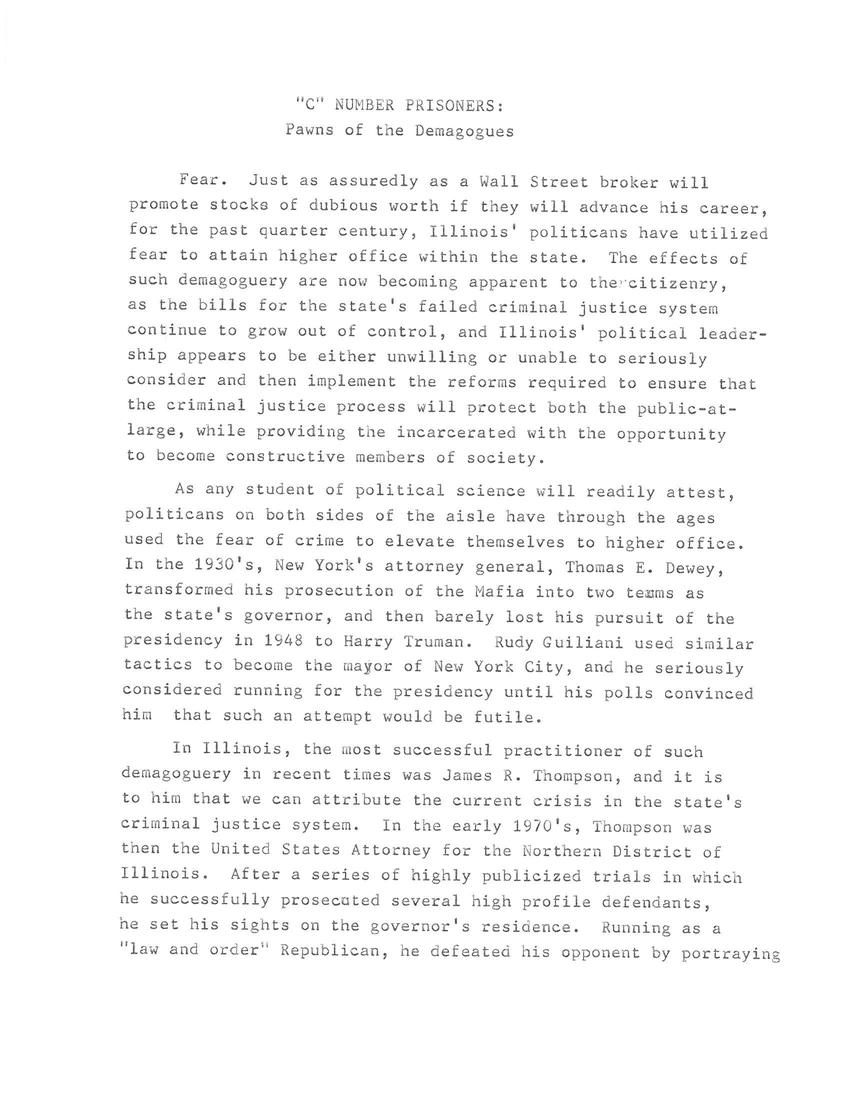
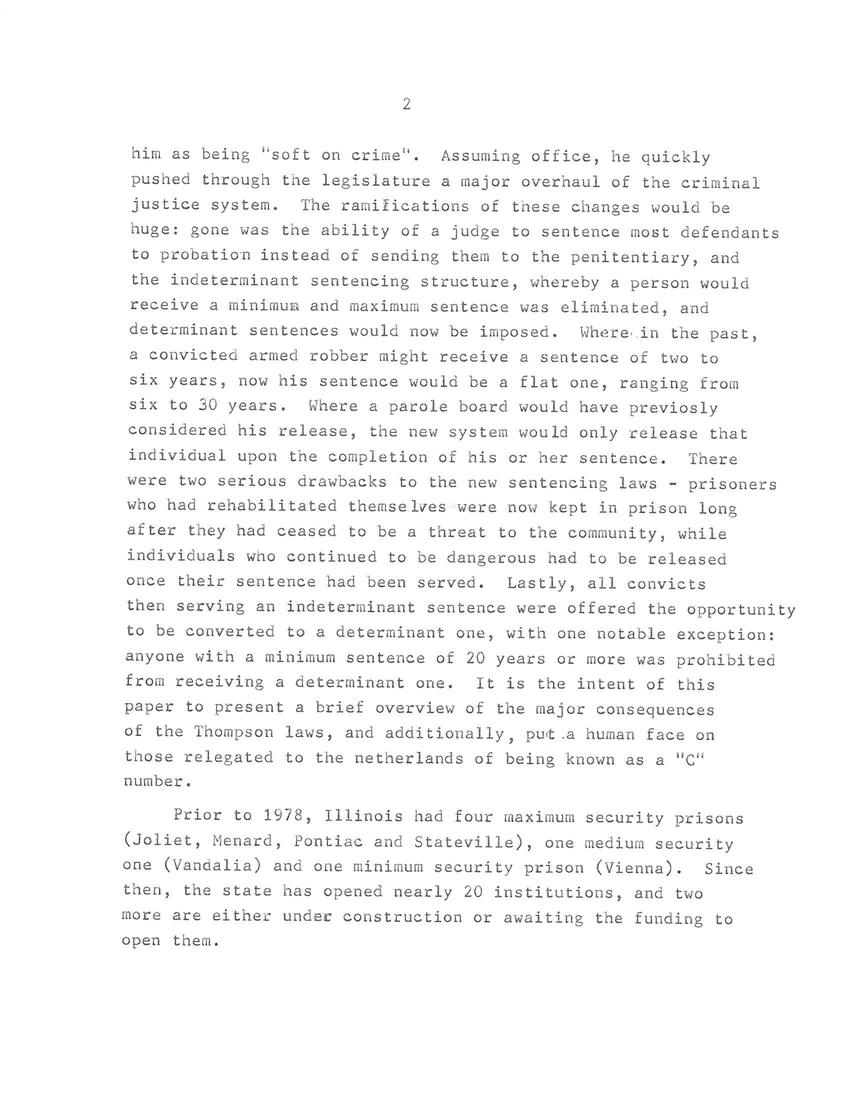
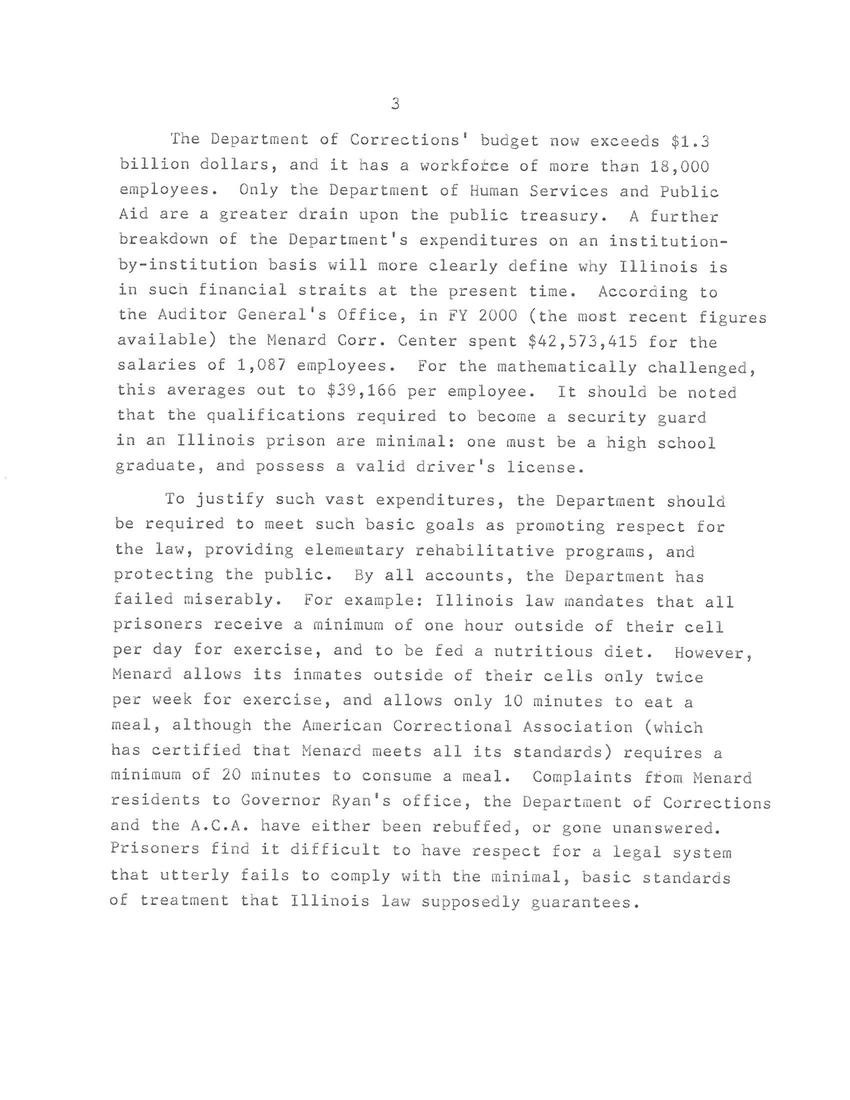
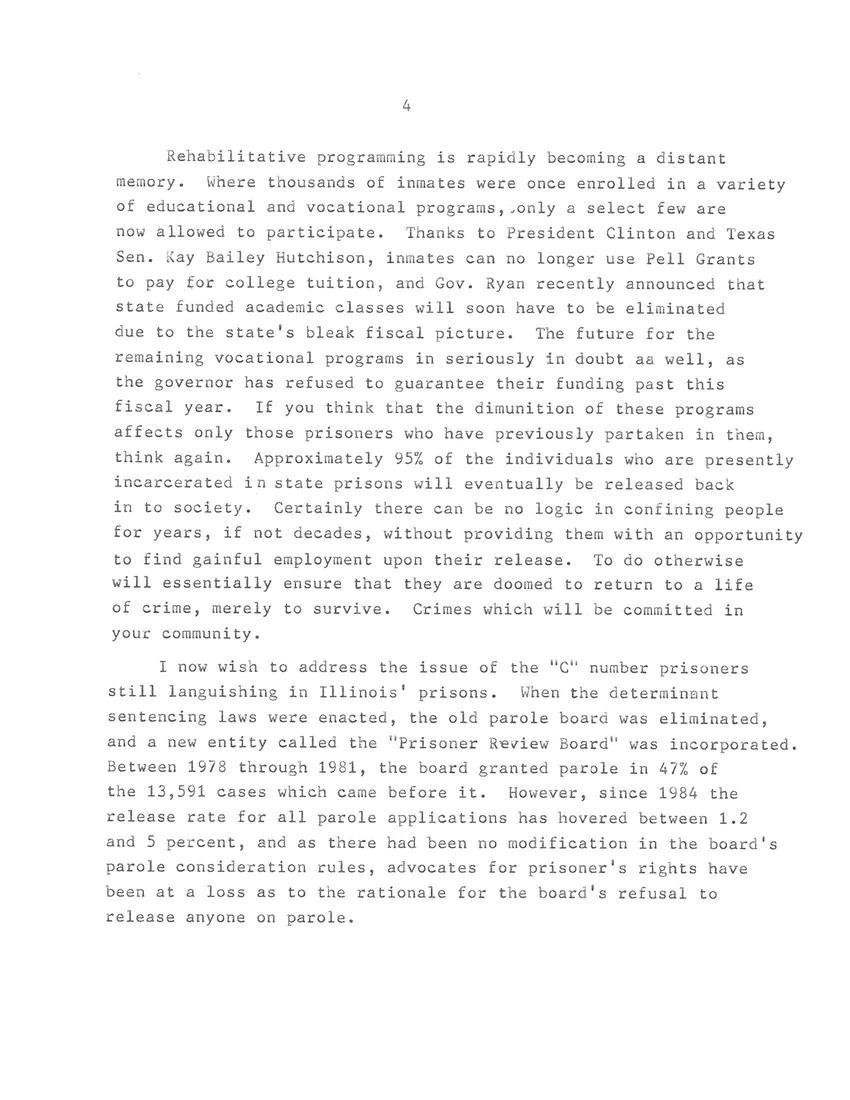
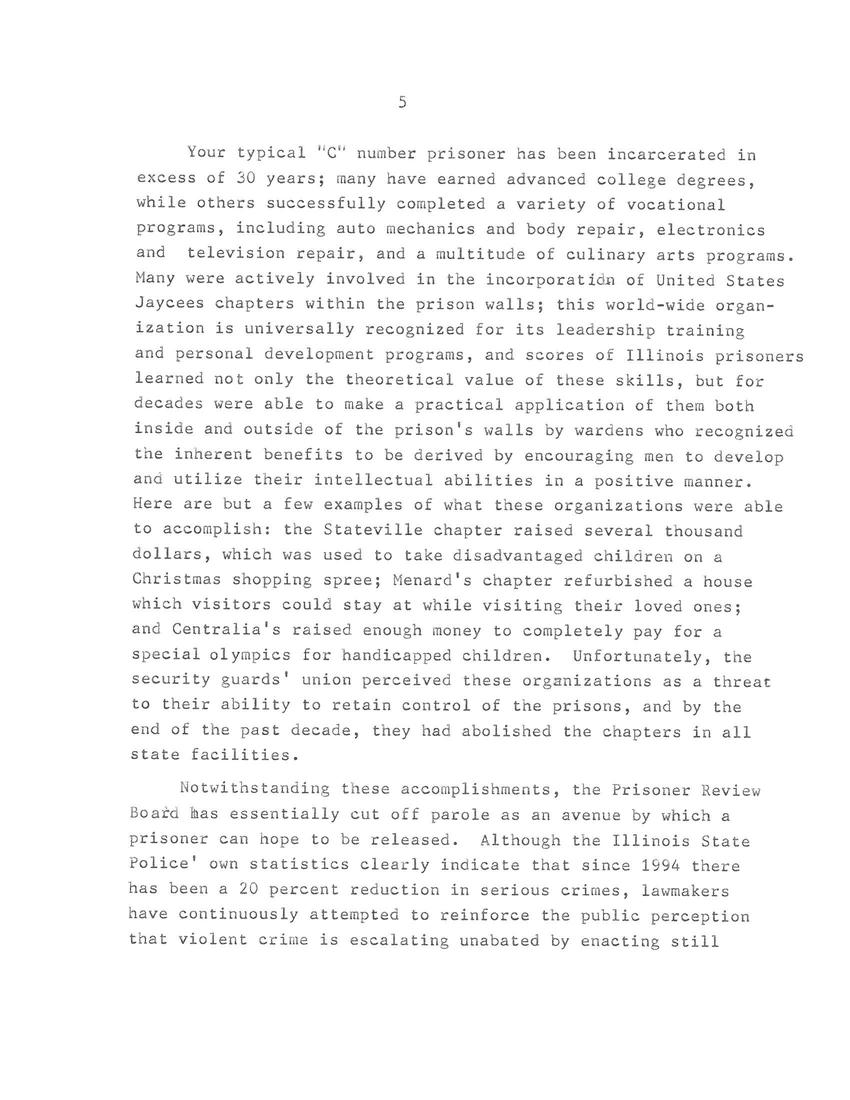
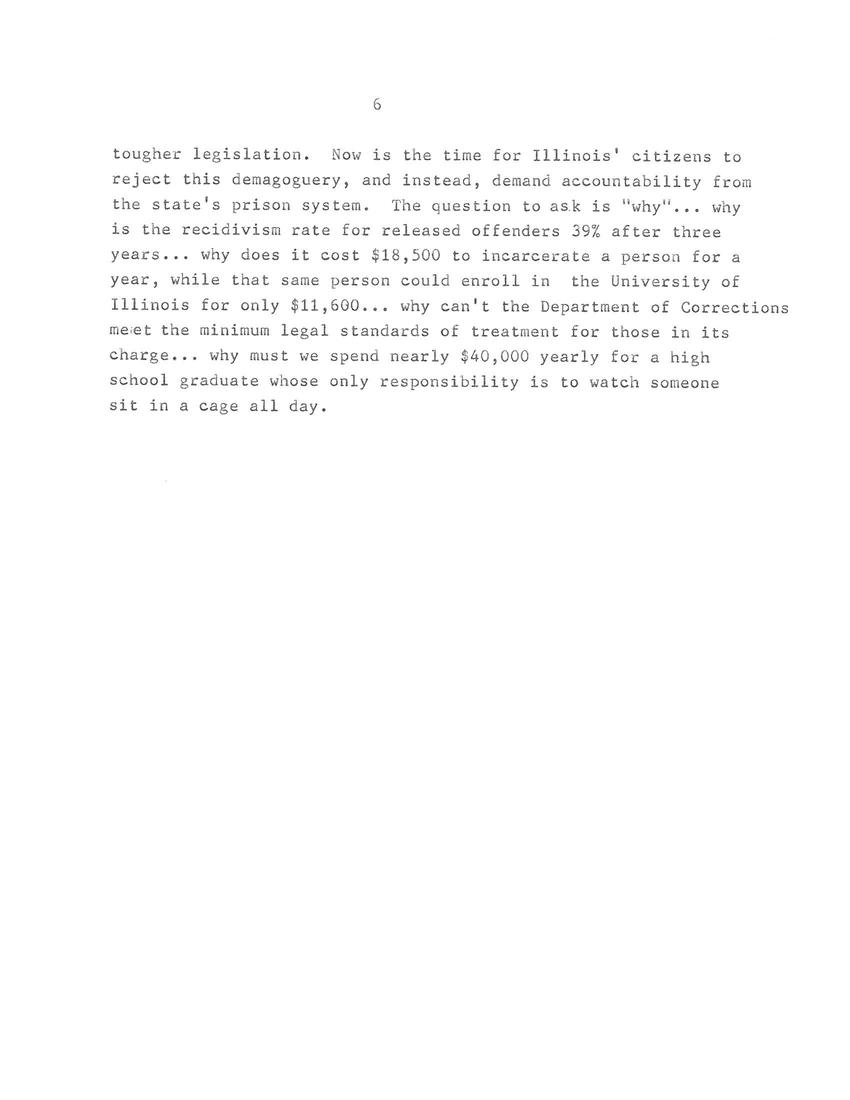

Replies (1)
it is the third of February.... and I still didn't get a letter from you?
You said you would send a letter right away after the one of the 11th of January.
I didn't see it .. yet...
I hope all is well with you? You got the news Lynn is born? She was born on the 21st of January! Weighed 3,710 kilos and measured 51 centimeters; that is about half a meter.
She is a healthy little girl!!
A letter of mine came back, because of 20 cent too less on a envelope. It is sent back to you.
I miss you... love, Rita